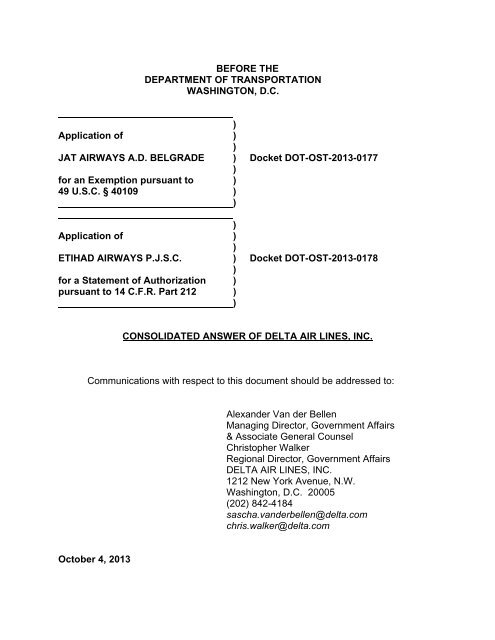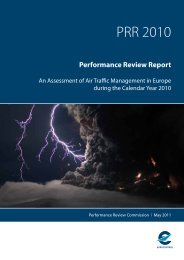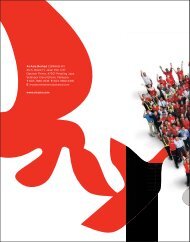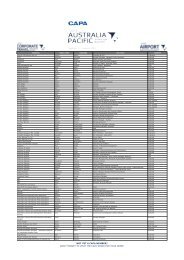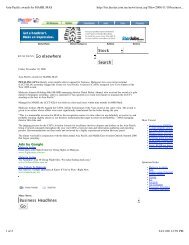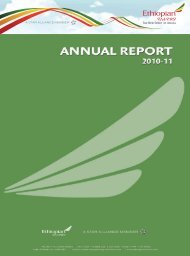Consolidated Answer of Delta Air Lines
Consolidated Answer of Delta Air Lines
Consolidated Answer of Delta Air Lines
You also want an ePaper? Increase the reach of your titles
YUMPU automatically turns print PDFs into web optimized ePapers that Google loves.
BEFORE THE<br />
DEPARTMENT OF TRANSPORTATION<br />
WASHINGTON, D.C.<br />
)<br />
Application <strong>of</strong> )<br />
)<br />
JAT AIRWAYS A.D. BELGRADE ) Docket DOT-OST-2013-0177<br />
)<br />
for an Exemption pursuant to )<br />
49 U.S.C. § 40109 )<br />
)<br />
)<br />
Application <strong>of</strong> )<br />
)<br />
ETIHAD AIRWAYS P.J.S.C. ) Docket DOT-OST-2013-0178<br />
)<br />
for a Statement <strong>of</strong> Authorization )<br />
pursuant to 14 C.F.R. Part 212 )<br />
)<br />
CONSOLIDATED ANSWER OF DELTA AIR LINES, INC.<br />
Communications with respect to this document should be addressed to:<br />
Alexander Van der Bellen<br />
Managing Director, Government Affairs<br />
& Associate General Counsel<br />
Christopher Walker<br />
Regional Director, Government Affairs<br />
DELTA AIR LINES, INC.<br />
1212 New York Avenue, N.W.<br />
Washington, D.C. 20005<br />
(202) 842-4184<br />
sascha.vanderbellen@delta.com<br />
chris.walker@delta.com<br />
October 4, 2013
BEFORE THE<br />
DEPARTMENT OF TRANSPORTATION<br />
WASHINGTON, D.C.<br />
)<br />
Application <strong>of</strong> )<br />
)<br />
JAT AIRWAYS A.D. BELGRADE ) Docket DOT-OST-2013-0177<br />
)<br />
for an Exemption pursuant to )<br />
49 U.S.C. § 40109 )<br />
)<br />
)<br />
Application <strong>of</strong> )<br />
)<br />
ETIHAD AIRWAYS P.J.S.C. ) Docket DOT-OST-2013-0178<br />
)<br />
for a Statement <strong>of</strong> Authorization )<br />
pursuant to 14 C.F.R. Part 212 )<br />
)<br />
CONSOLIDATED ANSWER OF DELTA AIR LINES, INC.<br />
<strong>Delta</strong> <strong>Air</strong> <strong>Lines</strong>, Inc. (“<strong>Delta</strong>”) hereby files this <strong>Consolidated</strong> <strong>Answer</strong> to the<br />
Application <strong>of</strong> Jat <strong>Air</strong>ways a.d. Belgrade (“JAT”) for an exemption from 49 U.S.C. §<br />
41301 to provide scheduled foreign air transportation <strong>of</strong> persons, property, and mail<br />
between Serbia and the United States on a codeshare-only basis and the Application <strong>of</strong><br />
Etihad <strong>Air</strong>ways P.J.S.C. (“Etihad”) for a Statement <strong>of</strong> Authorization permitting Etihad to<br />
display the designator code <strong>of</strong> JAT on flights Etihad operates between Abu Dhabi, on<br />
the one hand, and various points in the United States, on the other hand, that connect
<strong>Delta</strong> <strong>Air</strong> <strong>Lines</strong> <strong>Consolidated</strong> <strong>Answer</strong><br />
Page 2<br />
with JAT-operated services between Belgrade and Abu Dhabi. 1<br />
<strong>Delta</strong> opposes, and<br />
urges the Department to reject, both applications.<br />
JAT and Etihad’s proposed codeshare services are highly circuitous,<br />
commercially implausible, and are likely to cause consumer confusion. Moreover, JAT<br />
and Etihad have not been candid with the Department in their characterization <strong>of</strong> the<br />
facts concerning Etihad’s ownership interest in and effective control <strong>of</strong> JAT. JAT and<br />
Etihad bear the burden <strong>of</strong> addressing these issues in a forthright manner, particularly<br />
given that the proposed services would be the product <strong>of</strong> market-distorting, anticompetitive<br />
state subsidies from which both Etihad and JAT benefit. The proposed<br />
codeshares are not in the public interest and, accordingly, the Department should deny<br />
both JAT’s exemption request and Etihad’s application for a statement <strong>of</strong> authorization.<br />
I. The proposed codeshare routes are irrational and do not serve the public<br />
interest<br />
While <strong>Delta</strong> believes that codeshare arrangements are typically in the public<br />
interest where they increase opportunities for travel and expand air service networks for<br />
the benefit <strong>of</strong> consumers, the codeshare services proposed by JAT and Etihad are not<br />
1 To the extent necessary, <strong>Delta</strong> hereby moves for leave to file an answer to the Application <strong>of</strong><br />
Etihad for a Statement <strong>of</strong> Authorization, dated September 19, 2013, pursuant to 14 C.F.R. §<br />
302.9. The Etihad and JAT applications are inextricably interrelated because the Department<br />
must approve both applications before JAT and Etihad may implement their proposed U.S.<br />
codeshare services. Thus, <strong>Delta</strong>’s answer inevitably raises issues affecting the Department’s<br />
consideration <strong>of</strong> the Etihad application as well as the JAT application, thereby establishing good<br />
cause for <strong>Delta</strong> to submit a single, consolidated answer to both applications.
<strong>Delta</strong> <strong>Air</strong> <strong>Lines</strong> <strong>Consolidated</strong> <strong>Answer</strong><br />
Page 3<br />
in the public interest because they have no market or consumer service based rationale<br />
and would only create confusion and complexity for consumers. 2<br />
JAT and Etihad are proposing codeshare services on routings from Belgrade<br />
(BEL) to New York (JFK), Washington (IAD), and Chicago (ORD) via Abu Dhabi (AUH).<br />
These routes are so extraordinarily circuitous (nearly 5,000 miles <strong>of</strong> additional circuity in<br />
each direction) that one must question why any consumer would regard their addition to<br />
the marketplace to constitute a rational service option or to <strong>of</strong>fer any consumer benefit.<br />
Currently, there is robust competition for travel between Belgrade and<br />
destinations in the United States via European hubs, where convenient, non-circuitous<br />
codeshare and interline connections are available. JAT already codeshares with six<br />
European airlines that connect on to the U.S., and has interline agreements with dozens<br />
<strong>of</strong> other airlines with transatlantic service. At least eight different transatlantic carriers<br />
serve Belgrade. For example, connecting services between Belgrade and Chicago via<br />
Amsterdam, Munich, Vienna, or Frankfurt, involve journeys <strong>of</strong> approximately 5,000<br />
miles. By contrast, a routing from Belgrade to Chicago via Abu Dhabi is nearly twice as<br />
long: approximately 9,640 miles. Such an extremely circuitous itinerary would add<br />
nearly 5,000 miles to a consumer’s journey from Belgrade to the United States.<br />
2 In order for the Department to approve the JAT and Etihad applications, it must find that the<br />
services proposed are in the public interest See 49 U.S.C. § 40109(c); 14 C.F.R. § 212.11.<br />
Moreover, as JAT concedes in its application, the Department is not subject to any obligation<br />
imposed by a bilateral air service agreement to approve the JAT application. JAT Application at<br />
2.
<strong>Delta</strong> <strong>Air</strong> <strong>Lines</strong> <strong>Consolidated</strong> <strong>Answer</strong><br />
Page 4<br />
Accordingly, it is highly unlikely that a rational consumer would seek out itineraries via<br />
Abu Dhabi unless fares were artificially low, i.e., unless JAT and Etihad plan to engage<br />
in capacity dumping at below-market fares.<br />
We note that the JAT/Etihad proposal does not comply with IATA fare rules on<br />
maximum permitted miles (MPM). MPM on the JFK-Belgrade route is 5,404 miles,<br />
which the JAT/Etihad routing via Abu Dhabi exceeds by a whopping 2,469 miles.<br />
Thus, not only would the proposed codeshare routes not satisfy any new or<br />
currently unmet consumer demand; they would cause confusion and complexity in the<br />
marketplace (e.g., by cluttering schedule and fare displays and obscuring the<br />
consumer-facing availability <strong>of</strong> superior itineraries and service options).<br />
Accordingly, the Department should reject JAT’s and Etihad’s applications<br />
because their proposed codeshare arrangements are not in the public interest.<br />
II.<br />
The proposed codeshare arrangements are ripe for market abuse in light <strong>of</strong><br />
Etihad’s and JAT’s receipt <strong>of</strong> state subsidies<br />
The proposed codeshare involves two state-owned airlines and one, Etihad, that<br />
is heavily state-subsidized. The Department has, previously, expressed concern about<br />
state subsidies in its consideration <strong>of</strong> the “public interest.” 3<br />
Moreover, the Department<br />
has specifically stated that among its core policy objectives is to “[e]nsure that<br />
3 See, e.g., Applications <strong>of</strong> Iberia, Lineas Aereas de Espana, S.A. and Carnival <strong>Air</strong> <strong>Lines</strong>, Order<br />
94-9-23 at 4 (“we share American’s concerns on the issue <strong>of</strong> subsidies. Indeed, Secretary Pena<br />
has already written to Marcelino Aquirre, EU Commissioner for Transport and Energy,<br />
specifically to express his serious concern regarding the European Commission’s policy on<br />
state aid.”).
<strong>Delta</strong> <strong>Air</strong> <strong>Lines</strong> <strong>Consolidated</strong> <strong>Answer</strong><br />
Page 5<br />
competition is fair and the playing field is level by eliminating marketplace distortions,<br />
such as government subsidies ...”. 4<br />
Here, both JAT and Etihad have benefitted from the<br />
direct infusion <strong>of</strong> government capital, 5 and Etihad in particular has benefitted from unfair<br />
tax advantages, subsidies for fuel and airport fees, and sizeable government<br />
investments in infrastructure. 6<br />
These subsidies have a market-distortive effect and are<br />
inconsistent with U.S. international aviation policy.<br />
In recent years, certain Gulf states have increasingly used their flag carriers “to<br />
expand their services and widen their networks in support <strong>of</strong> national policies to develop<br />
incoming tourism or local business activity and trade.” 7<br />
This is the case in Abu Dhabi,<br />
which has been using its vast oil wealth to rapidly expand Etihad’s network and fleet as<br />
4 Statement <strong>of</strong> United States International <strong>Air</strong> Transportation Policy, 60 Fed. Reg. 21841, 21844<br />
(Dep’t Transportation May 3, 1995).<br />
5 See, e.g., “Etihad to Buy Stake in Serbia’s JAT as CEO Hogan Reworks Carrier,” Misha Savic,<br />
Bloomberg.com (Aug. 1, 2013) (noting that “Serbia will match” Etihad’s $100 million investment<br />
in JAT and that it will “assume liabilities <strong>of</strong> its flag carrier ‘so <strong>Air</strong> Serbia is a new company, a<br />
clean sheet <strong>of</strong> paper”).<br />
6 See, e.g., Hearing <strong>of</strong> the Terrorism, Nonproliferation and Trade Subcommittee <strong>of</strong> the House<br />
Foreign Affairs Committee Subject: "The Abu Dhabi Pre-Clearance Facility: Implications for U.S.<br />
Businesses and National Security", Statement by Representative Brad Sherman (D-CA) (July<br />
10, 2013); “<strong>Air</strong> France-KLM chief urges Europe to restrict Gulf carriers,” Claire Valdini,<br />
ArabianBusiness.com (Apr. 1, 2013); “Jobs on a wing and a prayer,” Paul Howes, Sunday<br />
Telegraph (Sydney) (Apr. 1, 2012); “Abu Dhabi <strong>Air</strong>ports Company Receives Executive Council<br />
Approval to Build the Midfield Terminal Complex,” Press Release, Abu Dhabi <strong>Air</strong>ports Company<br />
(Feb. 1, 2012).<br />
7 Rigas Doganis, Flying Off Course: <strong>Air</strong>line Economics and Marketing, p. 322 (Routledge Taylor<br />
& Francis Group, 4th ed. 2010).
<strong>Delta</strong> <strong>Air</strong> <strong>Lines</strong> <strong>Consolidated</strong> <strong>Answer</strong><br />
Page 6<br />
part <strong>of</strong> a strategy to develop Abu Dhabi as a hub and economic center. 8<br />
These policies<br />
– which include the introduction <strong>of</strong> excess capacity on routes and place network<br />
expansion above all else, including pr<strong>of</strong>itability – are highly disruptive and traderestrictive,<br />
depressing fares and cargo yields and destabilizing global markets. 9<br />
In support <strong>of</strong> Abu Dhabi’s broader aviation strategy, Etihad has acquired a 40<br />
percent stake in <strong>Air</strong> Seychelles; a 29.2 percent stake in <strong>Air</strong> Berlin; a 9 percent stake in<br />
Virgin Australia; and around a 3 percent stake in Aer Lingus. 10<br />
Etihad is also in the final<br />
stages <strong>of</strong> a $379 acquisition <strong>of</strong> a 24 percent stake in Jet <strong>Air</strong>ways <strong>of</strong> India as part <strong>of</strong> its<br />
“acquisition binge.” 11<br />
The JAT acquisition, while the most aggressive in terms <strong>of</strong> the<br />
size <strong>of</strong> Etihad’s equity stake and the control that Etihad will exercise over JAT, is part <strong>of</strong><br />
this pattern <strong>of</strong> rapid network expansion.<br />
Beyond Etihad’s acquisition <strong>of</strong> JAT, its activities are all closely connected to Abu<br />
Dhabi’s broader industrial policy for the aviation sector. For example, earlier this year,<br />
Etihad acquired three companies – Abu Dhabi <strong>Air</strong>port Services, Abu Dhabi In-Flight<br />
Catering, and Abu Dhabi Cargo Company – from the Abu Dhabi <strong>Air</strong>ports Company<br />
8 See “UAE’s Etihad to buy 49 percent stake in Serbian airline,” Ivana Sekularac, Reuters (Aug.<br />
1, 2013) (“Backed by oil wealth, Etihad has aggressively expanded its global reach through<br />
codeshares and minority stakes.”).<br />
9 Doganis at 322.<br />
10 “The Aussies Behind the Best <strong>Air</strong>line You’ve Never Flown,” Kenneth Rapoza, Forbes (March<br />
12, 2013).<br />
11 “Etihad Close To Taking Minority Stake in India’s Jet <strong>Air</strong>ways,” Kenneth Rapoza, Forbes<br />
(Sept. 19, 2013).
<strong>Delta</strong> <strong>Air</strong> <strong>Lines</strong> <strong>Consolidated</strong> <strong>Answer</strong><br />
Page 7<br />
(“ADAC”), a state-owned and operated entity. 12<br />
In 2012, ADAC announced that it would<br />
begin construction <strong>of</strong> a new Midfield Terminal Complex at Abu Dhabi International<br />
<strong>Air</strong>port for the primary benefit <strong>of</strong> Etihad. 13<br />
Such coordination between Etihad and ADAC<br />
is emblematic <strong>of</strong> the Abu Dhabi government’s aviation industrial policy, which is<br />
dependent in large part on ensuring Etihad’s global competitiveness. As Ulrich Schulte-<br />
Strathaus, then-president <strong>of</strong> the Association <strong>of</strong> European <strong>Air</strong>lines said <strong>of</strong> Etihad and<br />
other Gulf carriers in 2011, “[they] are owned by their respective governments and<br />
operated as an instrument <strong>of</strong> national strategy ... and they are integrated vertically<br />
across commerce, tourism and foreign policy.” 14<br />
Etihad’s receipt <strong>of</strong> subsidies makes the proposed codeshare arrangements with<br />
JAT ripe for market distortion and abuse. These routes, as discussed above, are highly<br />
circuitous, not responsive to any market demand, and thus unlikely to be pr<strong>of</strong>itable in<br />
their own right. In order to attract any consumer to utilize these proposed codeshare<br />
services, JAT and Etihad would have to price at below-market fares. The Department<br />
should scrutinize the proposed JAT/Etihad codeshare to better understand how the<br />
carriers intend to <strong>of</strong>fer competitive service without artificially dumping capacity. Ins<strong>of</strong>ar<br />
as the proposed codeshare is enabled through the airlines’ receipt <strong>of</strong> state subsidies or<br />
12 “Etihad to acquire Abu Dhabi airport services firms,” Trade Arabia (May 19, 2013).<br />
13 “Abu Dhabi <strong>Air</strong>ports Company Receives Executive Council Approval to Build the Midfield<br />
Terminal Complex,” Press Release, Abu Dhabi <strong>Air</strong>ports Company (Feb. 1, 2012).<br />
14 See “Gulf Carriers Push For Long-Haul Corporate Business,” Amon Cohen,<br />
BusinessTravelNews (Feb. 14, 2011).
<strong>Delta</strong> <strong>Air</strong> <strong>Lines</strong> <strong>Consolidated</strong> <strong>Answer</strong><br />
Page 8<br />
to further commercial or foreign government policy objectives that do not relate to the<br />
U.S. public interest, the Department should deny the JAT and Etihad applications.<br />
III.<br />
JAT and Etihad have mischaracterized Etihad’s ownership and effective<br />
control <strong>of</strong> JAT, which are significantly more extensive than suggested<br />
The Department’s policy requires that a foreign air carrier be substantially owned<br />
and effectively controlled by citizens <strong>of</strong> its homeland in order to qualify to receive a<br />
foreign air permit or exemption authority to serve the United States. 15<br />
JAT states in its<br />
application that it is “owned and controlled by Serbian citizens.” 16<br />
Then, in a footnote,<br />
JAT states that it is “in negotiations” for Etihad to acquire a 49 percent stake in JAT, but<br />
that in any event “JAT will remain substantially owned and effectively controlled by<br />
Serbian citizens.” 17<br />
However, according to recent press reports that (to the best <strong>of</strong><br />
<strong>Delta</strong>’s information) have not been contradicted by Etihad or JAT, Etihad’s investment in<br />
JAT and the steps Etihad is taking to exert control over JAT, are much more definite; in<br />
fact, it seems clear that JAT/Etihad’s proposed codeshare services to the United States<br />
via Abu Dhabi are predicated on the consummation <strong>of</strong> Etihad’s plans to own and control<br />
JAT.<br />
15 See, e.g., Notice <strong>of</strong> Action Taken (Corrected Copy), issued March 13, 2013, Docket DOT<br />
OST-2013-0021 (granting exemption to Boliviana de Aviacion (BoA)).<br />
16 JAT Application at 4.<br />
17 JAT Application at 4, n. 7.
<strong>Delta</strong> <strong>Air</strong> <strong>Lines</strong> <strong>Consolidated</strong> <strong>Answer</strong><br />
Page 9<br />
According to recent press reports, Etihad has agreed to acquire a 49 percent<br />
stake in JAT, JAT Catering, and JAT’s handling division SU-PORT. Etihad’s<br />
relationship with JAT extends far beyond its equity investment, however; newly branded<br />
“<strong>Air</strong> Serbia” <strong>Air</strong>bus A319 aircraft will be operated by Etihad crew; Etihad will negotiate<br />
with <strong>Air</strong>bus over the terms <strong>of</strong> previously ordered A319s; Etihad will invest in upgrades at<br />
Belgrade <strong>Air</strong>port Terminal 1; and, through the operation <strong>of</strong> four agreements between<br />
Etihad and the Republic <strong>of</strong> Serbia, Etihad will provide immediate equity infusions into<br />
the Serbian airline. 18<br />
Moreover, although the Republic <strong>of</strong> Serbia will maintain a majority<br />
ownership interest, Etihad will acquire de facto control over JAT. Indeed, JAT’s CEO<br />
reportedly will work under a five-year management contract with Etihad. 19<br />
In short, JAT<br />
will be a wholly controlled (even if not wholly owned) subsidiary <strong>of</strong> Etihad.<br />
Etihad itself has acknowledged the true nature <strong>of</strong> its plans for control <strong>of</strong> JAT. In a<br />
briefing to JAT staff, Etihad CEO James Hogan explained that “Etihad <strong>Air</strong>ways has<br />
been appointed to a five-year management contract, effective 1 August”; in other words,<br />
Etihad views itself as the management <strong>of</strong> JAT. 20<br />
Etihad envisions “shared resources”<br />
between the airlines; the “insourcing” or ground handling, catering, and line<br />
18 “South East Europe: Etihad Takes Over JAT,” International Meetings Review (Sept. 2, 2013),<br />
available at http://www.internationalmeetingsreview.com/south-east-europe/south-east-europeetihad-takes-over-jat-96727.<br />
19 “Etihad to Acquire 49% Of New Serbian <strong>Air</strong>line,” Jens Flottau, Aviation Week (Aug. 1, 2013).<br />
20 <strong>Air</strong> Serbia Staff Briefing (Aug. 1, 2013), available at<br />
http://new.livestream.com/etihad/<strong>Air</strong>SerbiaStaffBriefing (minute 4:48).
<strong>Delta</strong> <strong>Air</strong> <strong>Lines</strong> <strong>Consolidated</strong> <strong>Answer</strong><br />
Page 10<br />
maintenance; the “consolidation <strong>of</strong> some key tasks in Abu Dhabi”, such as scheduling<br />
and revenue management; an “identical in-flight product” on <strong>Air</strong> Serbia and Etihad<br />
narrow-body fleets; joint training <strong>of</strong> pilots and crews; and joint procurement <strong>of</strong> services<br />
and supplies. 21<br />
Etihad’s management and commercial co-opting <strong>of</strong> JAT demonstrate a<br />
level <strong>of</strong> effective control by Etihad that is not reflected in JAT’s misleading<br />
characterization <strong>of</strong> the Etihad acquisition.<br />
Thus, despite JAT’s assertion in its application, Etihad’s investment in the airline<br />
raises important questions about whether JAT is (or will remain) “effectively controlled<br />
by Serbian citizens.” <strong>Delta</strong> urges the Department to require clarification from JAT and<br />
Etihad with respect to Etihad’s ownership and control over JAT.<br />
IV.<br />
The lack <strong>of</strong> a U.S.-Serbia aviation bilateral agreement requires JAT to<br />
demonstrate clear public benefit<br />
In the absence <strong>of</strong> an aviation bilateral agreement, the Department should<br />
carefully examine JAT’s proposal to ensure public benefit. Rather than proposing an<br />
analogous codeshare agreement to those currently serving the U.S.-Serbia market,<br />
where United <strong>Air</strong>lines and US <strong>Air</strong>ways operate routings with partners that have less<br />
than 1% circuity, 22 JAT is proposing routes with 100% circuity, which would be highly<br />
21 <strong>Air</strong> Serbia: New Era, New Direction, presentation by James Hogan to <strong>Air</strong> Serbia staff (Aug. 1,<br />
2013), available at http://exyuaviation.blogspot.com/2013/08/jat-airways-takeover.html.<br />
22 JAT Application at 2.
<strong>Delta</strong> <strong>Air</strong> <strong>Lines</strong> <strong>Consolidated</strong> <strong>Answer</strong><br />
Page 11<br />
susceptible to capacity dumping and state-subsidy market distortions. As discussed<br />
above, such service is not in the public interest.<br />
V. The Department should discourage the abuse <strong>of</strong> TSA pre-clearance in Abu<br />
Dhabi<br />
In April, 2013, ABAC signed an agreement with U.S. Customs and Border<br />
Protection to open a pre-clearance screening facility at Abu Dhabi International<br />
<strong>Air</strong>port. 23<br />
The preclearance infrastructure, like the Abu Dhabi International <strong>Air</strong>port itself,<br />
would be financed by the Government <strong>of</strong> Abu Dhabi for the benefit <strong>of</strong> Etihad. 24<br />
U.S.<br />
airlines, including <strong>Delta</strong> and other members <strong>of</strong> <strong>Air</strong>lines for America, have vigorously<br />
objected to this agreement as being inimical to the interests <strong>of</strong> U.S. airlines and contrary<br />
to U.S. international aviation policy. 25<br />
The proposed JAT/Etihad codeshare raises<br />
additional concerns that the Government <strong>of</strong> Abu Dhabi and Etihad intend to use preclearance<br />
at Abu Dhabi to distort competition for international air travel by driving air<br />
traffic to Abu Dhabi under circumstances in which such preclearance <strong>of</strong>fsets the obvious<br />
disadvantages <strong>of</strong> the proposed codeshare routes’ circuity. Such an abuse <strong>of</strong> preclearance<br />
is inconsistent with the interests <strong>of</strong> the U.S. aviation industry and U.S.<br />
international aviation policy objectives.<br />
* * *<br />
23 “Where the Short Customs <strong>Lines</strong> Are,” Scott McCartney, The Wall Street Journal (July 31,<br />
2013).<br />
24 Id. (noting that Abu Dhabi “has agreed to cover most <strong>of</strong> the costs.”).<br />
25 “Lawmakers Hear Strong Arguments Regarding Abu Dhabi Preclearance,” Michael Bruno,<br />
Aviation Week (July 10, 2013).
<strong>Delta</strong> <strong>Air</strong> <strong>Lines</strong> <strong>Consolidated</strong> <strong>Answer</strong><br />
Page 12<br />
For the foregoing reasons, <strong>Delta</strong> objects to the above-captioned applications <strong>of</strong><br />
JAT and Etihad and urges the Department to deny them both.<br />
Respectfully submitted,<br />
_____________________________<br />
Alexander Van der Bellen<br />
Managing Director, Government Affairs<br />
& Associate General Counsel<br />
DELTA AIR LINES, INC.
CERTIFICATE OF SERVICE<br />
A copy <strong>of</strong> the foregoing <strong>Answer</strong> has been served this 4 th day <strong>of</strong> October, 2013, upon the<br />
following persons via email:<br />
anita.mosner@hklaw.com<br />
Jennifer.Nowak@hklaw.com<br />
robert.wirick@aa.com<br />
francis.heil@aa.com<br />
anbird@fedex.com<br />
sllunsford@fedex.com<br />
dan.weiss@united.com<br />
howard.kass@usairways.com<br />
rsilverberg@sgbdc.com<br />
jjohnson@sgbdc.com<br />
tom.fosko@airtransport.com<br />
jcanny@amerijet.com<br />
jrichardson@johnlrichardson.com<br />
rpommer@atlasair.com<br />
john.palo@evergreenairlines.com<br />
charters@evergreenairlines.com<br />
matwood@cozen.com<br />
mlbenge@zsrlaw.com<br />
kevin.montgomery@polaraircargo.com<br />
peter.beckett@polaraircargo.com<br />
john.allen@faa.gov<br />
Russell.Bailey@alpa.org<br />
dberg@airlines.org<br />
kglatz@airlines.org<br />
paul.gretch@dot.gov<br />
todd.homan@dot.gov<br />
Peter.Irvine@dot.gov<br />
info@airlineinfo.com


